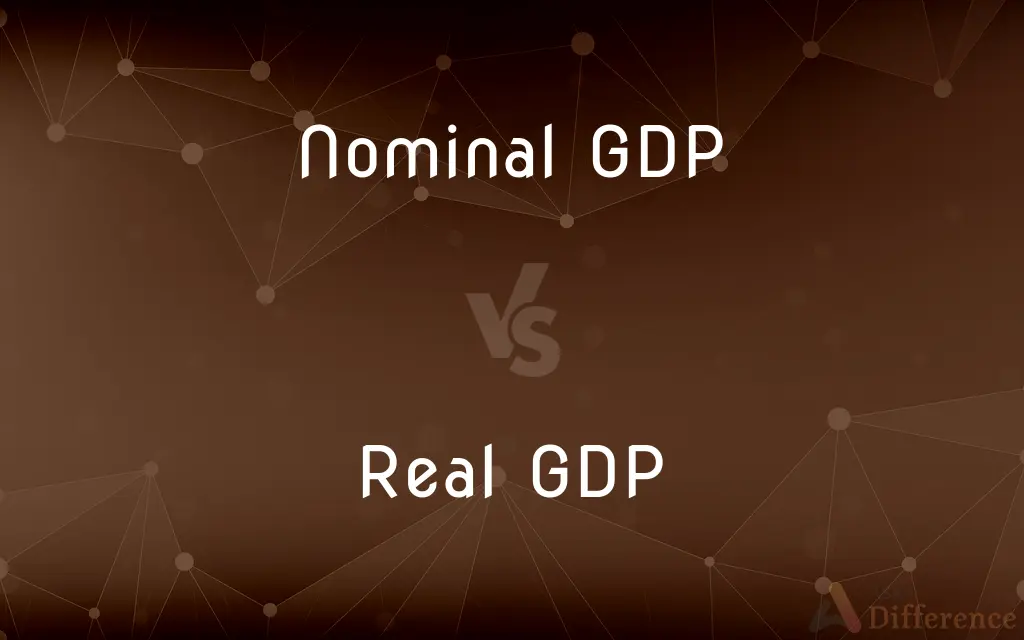Nominal GDP vs. Real GDP — What's the Difference?
By Tayyaba Rehman — Published on October 7, 2023
Nominal GDP is the total market value of all goods and services produced, not accounting for inflation, while Real GDP is adjusted for inflation, representing true economic growth.

Difference Between Nominal GDP and Real GDP
Table of Contents
ADVERTISEMENT
Key Differences
Nominal GDP and Real GDP are pivotal components for economic analysis, providing different perspectives on a country's economic performance and growth.
Nominal GDP refers to the total market value of all goods and services produced within a country in a specific time period, usually a year, without adjusting for inflation or deflation. It's evaluated at current market prices, incorporating all the changes in market prices that have occurred during the current year due to inflation or deflation. For instance, if there's significant inflation, Nominal GDP might give an impression of economic growth when, in actuality, the output might not have increased.
Conversely, Real GDP accounts for inflation or deflation, offering a more accurate representation of an economy’s size and how it’s growing over time. Real GDP is calculated using prices from a base year to provide a more realistic perspective on economic growth and productivity, disregarding price changes. Thus, Real GDP is a more reliable metric when comparing economic growth over different time periods or between different economies as it reflects the real quantity of goods and services produced.
These metrics are significant for governments, policymakers, and economists to formulate economic policies, understand economic health and growth, and make international comparisons. While Nominal GDP might be easier to calculate and helpful for year-to-year comparisons, Real GDP provides a deeper insight into the economic well-being of a nation, revealing the actual increase in production and services.
Comparison Chart
Definition
Measures GDP at current prices
Measures GDP at constant prices
ADVERTISEMENT
Adjustment
Not adjusted for inflation
Adjusted for inflation
Represents
Current economic output
Actual economic growth
Calculation
Easier to calculate
Requires a base year for calculation
Use
Suitable for year-to-year comparison
Better for analyzing over long periods
Compare with Definitions
Nominal GDP
It includes all the changes in market prices that have occurred during the current year due to inflation or deflation.
If the prices of goods and services increase, it will result in a higher Nominal GDP.
Real GDP
Real GDP is the inflation-adjusted measure of a country's economic output, reflecting the true value of goods and services produced.
Real GDP is crucial for accurately assessing long-term economic growth without the distortion of inflation.
Nominal GDP
It is the raw economic output, reflecting the current market value of all produced goods and services.
A surge in Nominal GDP could be attributed to either enhanced production or increased prices of goods and services.
Real GDP
Real GDP aids in international comparisons by providing a consistent measure across different price levels and currencies.
Real GDP provides a common ground for comparing the economic performance of countries with varying inflation rates and currencies.
Nominal GDP
Nominal GDP is crucial for year-to-year comparisons of a country’s economic performance.
Countries often use Nominal GDP to quickly compare economic output from one year to the next.
Real GDP
Real GDP is evaluated using prices from a base year, disregarding the current year's price changes.
By using stable prices from a base year, Real GDP reflects only the actual changes in production and services.
Nominal GDP
Nominal GDP calculates the economic output of a country using current market prices without adjusting for inflation.
If inflation is high, Nominal GDP might falsely indicate strong economic growth.
Real GDP
It provides a more accurate representation of an economy’s size and how it’s growing over time.
Analysts prefer Real GDP to compare economic growth across different countries as it eliminates the effects of inflation.
Nominal GDP
Nominal GDP can be misleading if not considered in conjunction with price levels.
A country might appear to be in an economic boom due to high Nominal GDP, which might just be due to inflated prices.
Real GDP
It is indicative of economic well-being and living standards in a country, portraying the real value of final goods and services.
A consistent increase in Real GDP signifies an improvement in economic health and living standards.
Common Curiosities
Does Nominal GDP depict the true economic growth of a country?
No, Nominal GDP does not depict true economic growth as it doesn’t adjust for inflation; Real GDP provides a more accurate reflection.
Can we use Nominal GDP to compare economies of different countries?
Comparing Nominal GDP across countries can be misleading due to varying price levels and currencies; Real GDP is more suitable for such comparisons.
Why is Nominal GDP important?
Nominal GDP is important as it provides a quick, current snapshot of economic activity within a country, crucial for year-to-year comparisons.
How is Real GDP adjusted for inflation?
Real GDP is adjusted for inflation by using prices from a base year, eliminating the impact of price level changes on GDP values.
Which one is better for analyzing long-term economic trends, Nominal GDP or Real GDP?
Real GDP is better for analyzing long-term economic trends as it reflects the actual quantity of goods and services produced, adjusted for inflation.
What happens to Nominal GDP during inflation?
During inflation, Nominal GDP increases as it reflects current market prices, potentially overstating economic growth.
How is Real GDP beneficial for policy formulation?
Real GDP is beneficial for policy formulation as it accurately represents economic growth and production levels, helping in more informed decision-making.
Is Real GDP always smaller than Nominal GDP?
Generally, in times of inflation, Real GDP is smaller than Nominal GDP; however, during deflation, Real GDP can be higher.
What are the components of Nominal and Real GDP?
Both Nominal and Real GDP are composed of consumer spending, investments, government spending, and net exports.
Why do economists prefer Real GDP over Nominal GDP for economic analysis?
Economists prefer Real GDP as it provides a more accurate and meaningful insight into actual economic growth and allows for comparison over different time periods.
Can a rise in Nominal GDP indicate increased production?
A rise in Nominal GDP can indicate increased production, but it could also be due to inflation; analyzing Real GDP is essential to confirm increased production.
Can changes in Nominal GDP reflect changes in national income?
Changes in Nominal GDP can reflect changes in national income, but for true reflection, adjustments for inflation, taxes, and savings are needed.
Which is easier to calculate, Nominal GDP or Real GDP?
Nominal GDP is easier to calculate as it involves current market prices, while Real GDP requires adjustments using a base year’s prices.
Does a fall in Real GDP always signify economic decline?
Yes, a fall in Real GDP typically signifies a reduction in the production of goods and services, indicating economic decline.
Is Real GDP a comprehensive measure of economic welfare?
While Real GDP is a vital indicator of economic health, it isn’t comprehensive as it doesn’t consider income distribution, environmental factors, or non-market activities.
Share Your Discovery

Previous Comparison
Chromakey vs. Greenscreen
Next Comparison
Will Be vs. Shall BeAuthor Spotlight
Written by
Tayyaba RehmanTayyaba Rehman is a distinguished writer, currently serving as a primary contributor to askdifference.com. As a researcher in semantics and etymology, Tayyaba's passion for the complexity of languages and their distinctions has found a perfect home on the platform. Tayyaba delves into the intricacies of language, distinguishing between commonly confused words and phrases, thereby providing clarity for readers worldwide.












































